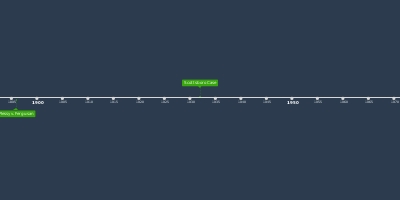1 gen 1987 anni - Meritor Savings Bank v. Vinson
Descrizione:
Sexual harassment that creates a hostile work environment is a form of sex discrimination prohibited by Title VII of the 1964 Civil Rights Act.Overview
Meritor Savings Bank v. Vinson, 477 U.S. 57, is a US labor law case. The United States Supreme Court, in a 9-0 decision, acknowledged sexual harassment as a violation of Title VII of the Civil Rights Act of 1964
HISTORY
BIOGRAPHY
- Patricia J. Barry
Argued the cause for the respondent
Also argued on
Lehman v. Nakshian (1980)
- F. Robert Troll, Jr.
Argued the cause for the petitioner
FIRAC
FACTS
After being dismissed from her job at a Meritor Savings Bank, Mechelle Vinson sued Sidney Taylor, the Vice President of the bank. Vinson charged that she had constantly been subjected to sexual harassment by Taylor over her four years at the bank. She argued such harassment created a "hostile working environment" and was covered by Title VII of the Civil Rights Act of 1964. Vinson sought injunctive relief along with compensatory and punitive damages against Taylor and the bank.
ISSUE
Did the Civil Rights Act prohibit the creation of a "hostile environment" or was it limited to tangible economic discrimination in the workplace?
HOLDING
Unanimous Decision
RATIONAL
The Court held that the language of Title VII was "not limited to 'economic' or 'tangible' discrimination," finding that Congress intended "'to strike at the entire spectrum of disparate treatment of men and women' in employment. . ." The Court noted that guidelines issued by the EEOC specified that sexual harassment leading to noneconomic injury was a form of sex discrimination prohibited by Title VII. The Court recognized that plaintiffs could establish violations of the Act "by proving that discrimination based on sex has created a hostile or abusive work environment." The Court declined to rule on the degree to which businesses could be liable for the conduct of specific employees.
RELATED CASES
- Jenson v. Eveleth Taconite Co.
Jenson v. Eveleth Taconite Co., 130 F.3d 1287, was the first class-action sexual harassment lawsuit in the United States. It was filed in 1988 on behalf of Lois Jenson and other female workers at the EVTAC mine in Eveleth, Minnesota on the state's northern Mesabi Range, which is part of the Iron Range.
- Oncale v. Sundowner Offshore Services, Inc.
Oncale v. Sundowner Offshore Services, 523 U.S. 75, was a decision of the Supreme Court of the United States. The case arose out of a suit for sex discrimination by a male oil-rig worker, who claimed that he was repeatedly subjected to sexual harassment by his male co-workers with the acquiescence of his employer.
- Crawford v. Nashville
Crawford v. Nashville, 555 U.S. 271, is a United States Supreme Court case in which the Court unanimously ruled that Title VII of the 1964 Civil Rights Act protects an employee who opposes unlawful sexual harassment, but does not report the harassment him or herself
https://law.justia.com/cases/federal/district-courts/FSupp/824/847/1460561/
https://www.oyez.org/cases/1997/96-568
https://www.oyez.org/cases/2008/06-1595
https://www.oyez.org/cases/1985/84-1979
Aggiunto al nastro di tempo:
Data:
1 gen 1987 anni
Adesso
~ 38 years ago
